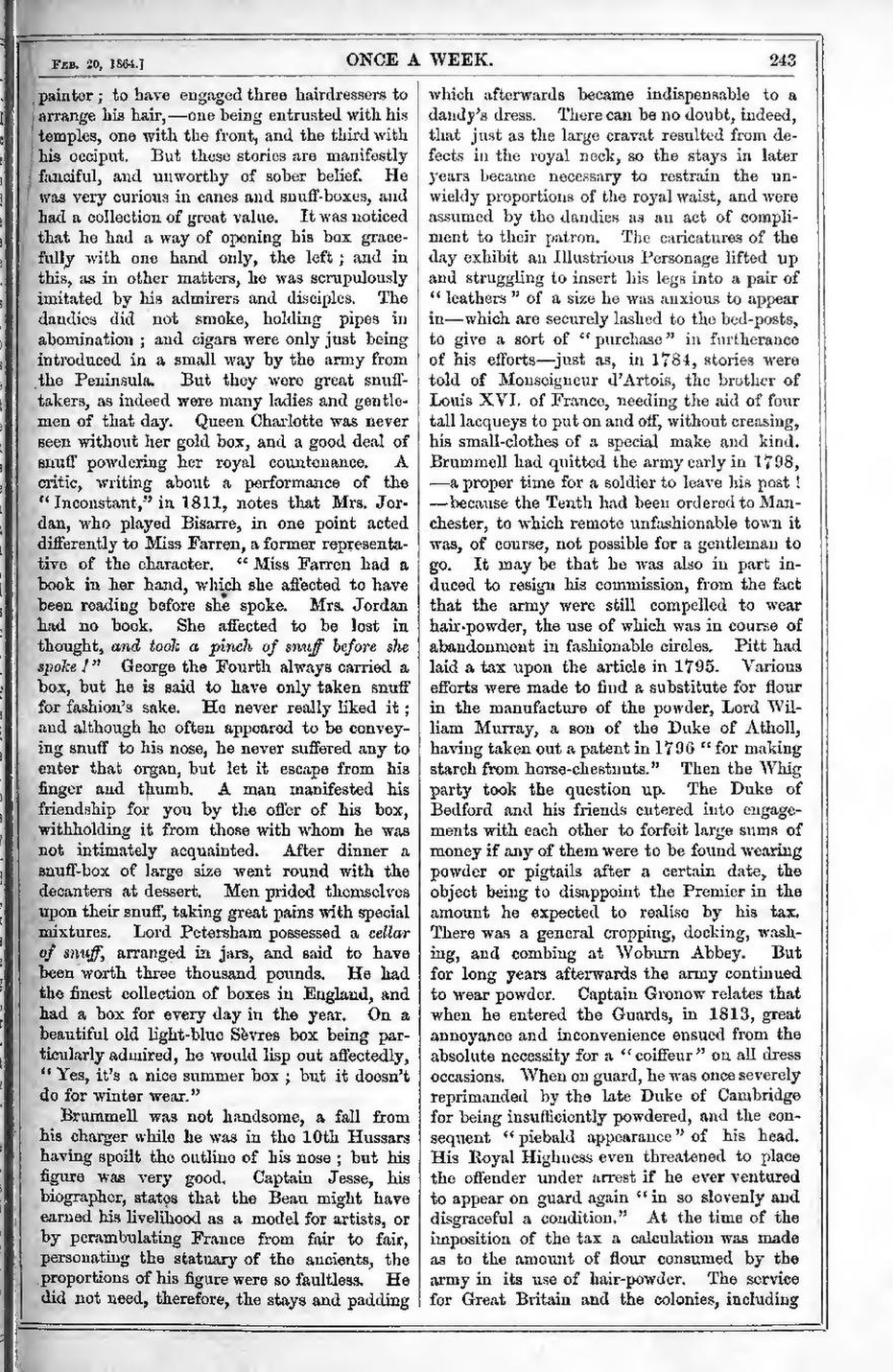Fkr.
ONCE A WEEK.
20, 1864.]
which afterwards became indispensable to a There can be no doubt, indeed, dandy's dress. that just as the large cravat resulted from defects in the so the stays in later ';, years became necessary to restrain the un-
painter; to have engaged three hairdressers to one being entrusted with his arrange his hair, temples, one with the front, and the third with his occiput. But these stories are manifestly
—
He and unworthy of sober belief. was very curious in canes and snuff-boxes, and It was noticed had a collection of great value. that he had a way of opening his box graceand in fully with one hand only, the left tin's, as in other matters, he was scrupulously The imitated by his admirers and disciples.
i
fanciful,
wieldy proportions of the royal waist, and were imed by the dandies as an act of compli-
ment
dandies did not smoke, holding pipes in and cigars were only just being abomination introduced in a small way by the army from But they were great snuffthe Peninsula. takers, as indeed were many ladies and gentlemen of that day. Queen Charlotte was never seen without her gold box, and a good deal of snuff powdering her royal countenance. A critic, writing about a performance of the " Inconstant,"' in 1811, notes that Mrs. Jordan, who played Bisarre, in one point acted differently to Miss Farren, a former representa" Miss Farren had a tive of the character. book in her hand, which she affected to have been reading before she spoke. Mrs. Jordan had no book. She affected to be lost in thought, and tool: a pinch of snuff before she sj)oke /" George the Fourth always carried a box, but he is said to have only taken snuff for fashion's sake. He never really liked it and although he often appeared to be conveying snuff to his nose, he never suffered any to enter that organ, but let it escape from his A man manifested his finger and thumb.
friendship for
you by the
offer of
his
box,
withholding it from those with whom he was not intimately acquainted. After dinner a snuff-box of large size went round with the decanters at dessert. Men prided themselves upon their snuff, taking great pains with special mixtures. Lord Petersham possessed a cellar of snuff, arranged in jars, and said to have been worth three thousand pounds. He had the finest collection of boxes in England, and had a box for every day in the year. On a beautiful old light-blue Sevres box being particularly admired, he
"
Yes,
it's
a nice
would
lisp
summer box
out affectedly, but it doesn't
do for winter wear." Brummell was not handsome, a fall from his charger while he was in the 10th Hussars having spoilt the outline of his nose ; but his figure was very good. Captain Jesse, his biographer, states that the Beau might have earned his livelihood as a model for artists, or by perambulating France from fair to fair, personating the statuary of the ancients, the He proportions of his figure were so faultless. did not need, therefore, the stays and padding
243
|
to their patron. The c uicatures of the day exhibit an Illustrious Personage lifted up and struggling to insert his legs into a pair of " leathers " of a size he was anxion
in
— which
are securely lashed to the
to give a sort of "purchase" in farthei of his efforts just as, in 1784, stories were
—
told of Monseigneur d'Artois, the brother of Louis XVI. of France, needing the aid of four tall
lacqueys to put on and
off,
without ere
make and kind. Brummell had quitted the army early in 1798,
his small-clothes of a special
—a proper time
for a soldier to leave his
— because the Tenth had been ordered to post .Manchester, to
!
which remote unfashionable town
it
was, of course, not possible for a gentleman to It may be that he was also in part ingo.
from the fact compelled to wear hair-powder, the use of which was in course of
duced to resign
that the
his commission,
army were
abandonment
still
in fashionable circles.
Pitt had
Various were made to find a substitute for flour in the manufacture of the powder, Lord William Murray, a son of the Duke of Atholl, " for making having taken out a patent in 1796 " Then the Whig starch from horse-chestnuts.
laid a tax
upon the
article in
1795.
efforts
The Duke of party took the question up. Bedford and his friends eutered into engagements with each other to forfeit large sums of money if any of them were to be found wearing powder or pigtails after a certain date, the object being to disappoint the Premier in the amount he expected to realise by his tax. There was a general cropping, docking, washBut ing, and combing at Woburn Abbey. for long years afterwards the army continued to wear powder. Captain Gronow relates that when he entered the Guards, in 1813, great annoyance and inconvenience ensued from the absolute necessity for a "coiffeur" on all dress occasions. When on guard, he was on reprimanded by the late Duke of Cambridge for being insufficiently powdered, " "
and the con-
of his head. appearance His Royal Highness even threatened to place the offender under arrest if he ever ventured
sequent
piebald
to appear on guard again disgraceful a condition."
"
in
At
so slovenly
and
the time of the
imposition of the tax a calculation was made as to the amount of flour consumed by the army in its use of hair-powder. The service
for Great Britain and the colonies, including